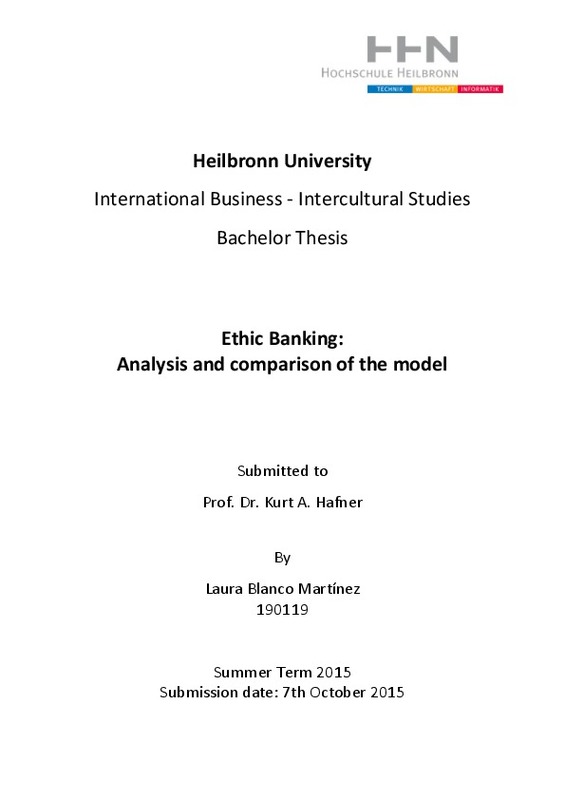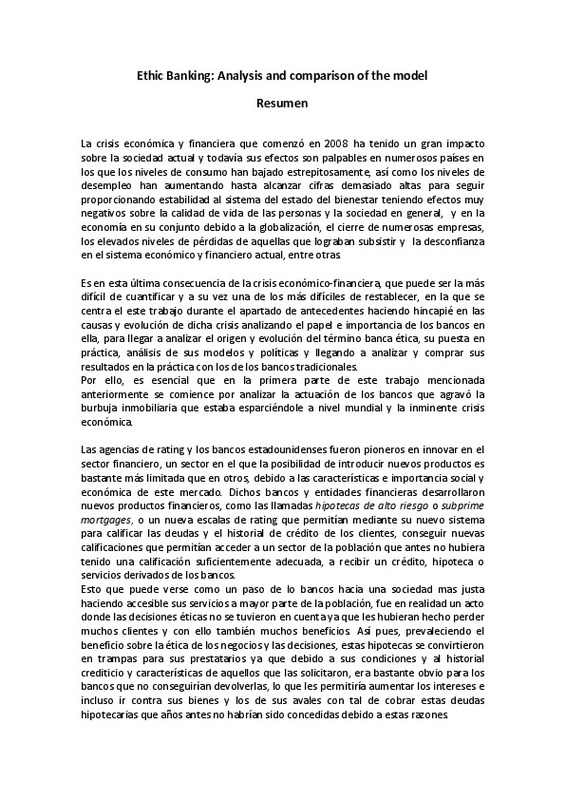JavaScript is disabled for your browser. Some features of this site may not work without it.
Buscar en RiuNet
Listar
Mi cuenta
Estadísticas
Ayuda RiuNet
Admin. UPV
Ethic banking: analysis and comparison of the model
Mostrar el registro sencillo del ítem
Ficheros en el ítem
| dc.contributor.advisor | Hafner, Kurt A.
|
es_ES |
| dc.contributor.author | Blanco Martínez, Laura
|
es_ES |
| dc.date.accessioned | 2016-01-13T15:36:14Z | |
| dc.date.available | 2016-01-13T15:36:14Z | |
| dc.date.created | 2015-11-05 | |
| dc.date.issued | 2016-01-13 | |
| dc.identifier.uri | http://hdl.handle.net/10251/59853 | |
| dc.description.abstract | [EN] Nowadays after the economical and financial crisis, the concept of Ethic Banking is becoming more popular and it is starting to be recognised by the people. This is why it may be perceived as a new concept sometimes, some people may think it is a new model or way of doing business in this sector that the banks have developed after the crisis, as a result of the situation of distrust generated because of the role of the banks during the last years in this global economical issue. Of course after the global crisis, the bailouts of the governments to the big banks, the bankrupts and, in general, the actuation of the banks nowadays and during the previous years of the crisis have had a positive influence on ethic banking. But if we look back and go through the concept of ethic banking we will discover that if was “invented” and started to be used long ago when a group of people in America discovered the use that the banks were giving to their savings. It was related then to a change in people’s mind, as nowadays is being used or known as a consequence of the questionable actions of regular banks, even if ethic banking existed before. Nowadays people care more about the ethic factor in business, it is not only an issue of the banking or financial sector, for example now people are claiming more transparency and are willing to know in which activities are the governments or big companies are involved in, like if they are supporting wars in other countries, investing in petrol or removable energies, or even if some companies are testing products on animals. Under my point of view, the ethic factor has always been there but just a small sector of the population or some collectives actually cared about it, but currently, due to the changes of the society behaviour and thoughts as a result of all the things discovered about governments, politicians, big companies and banks, people do now care more about it, specially when it is related with their money or savings. So after knowing for what these powerful institutions use people’s money for in bad times for the economy, knowing the risk and not caring about people or ethical factors in business, just thinking about their own benefit and the possibility of making more money, the whole society is nowadays very concern and angered about it. Even so, as mentioned above, those entire negative things had a good and positive effect for the ethics in business and precisely for the sector of ethic banking, which will be deeply analysed during this thesis. Before the years of the economical crisis, they were already several banks working according to the principles of ethic banking around the world, as Triodos Bank, founded in 1980 at Zeist (The Netherlands) or Fiare, created in 2003 at the Basque Country (Spain). During this thesis these models of ethic banking will be analysed and compared between them and also compared with some of the ‘regular’ financial banks. | es_ES |
| dc.description.abstract | [ES] La crisis económica y financiera que comenzó en 2008 ha tenido un gran impacto sobre la sociedad actual y todavía sus efectos son palpables en numerosos países en los que los niveles de consumo han bajado estrepitosamente, así como los niveles de desempleo han aumentando hasta alcanzar cifras demasiado altas para seguir proporcionando estabilidad al sistema del estado del bienestar teniendo efectos muy negativos sobre la calidad de vida de las personas y la sociedad en general, y en la economía en su conjunto debido a la globalización, el cierre de numerosas empresas, los elevados niveles de pérdidas de aquellas que lograban subsistir y la desconfianza en el sistema económico y financiero actual, entre otras. Es en esta última consecuencia de la crisis económico-‐financiera, que puede ser la más difícil de cuantificar y a su vez una de los más difíciles de restablecer, en la que se centra el este trabajo durante el apartado de antecedentes haciendo hincapié en las causas y evolución de dicha crisis analizando el papel e importancia de los bancos en ella, para llegar a analizar el origen y evolución del término banca ética, su puesta en práctica, análisis de sus modelos y políticas y llegando a analizar y comprar sus resultados en la práctica con los de los bancos tradicionales. Por ello, es esencial que en la primera parte de este trabajo mencionada anteriormente se comience por analizar la actuación de los bancos que agravó la burbuja inmobiliaria que estaba esparciéndole a nivel mundial y la inminente crisis económica. | es_ES |
| dc.format.extent | 74 | es_ES |
| dc.language | Inglés | es_ES |
| dc.publisher | Universitat Politècnica de València | es_ES |
| dc.rights | Reserva de todos los derechos | es_ES |
| dc.subject | Bancos | es_ES |
| dc.subject | Inversión socialmente responsable (ISR) | es_ES |
| dc.subject | Triodos Bank | es_ES |
| dc.subject | Crisis económica | es_ES |
| dc.subject | Banca ética | es_ES |
| dc.subject | Sector financiero | es_ES |
| dc.subject.other | Licenciatura en Administración y Dirección de Empresas-Llicenciatura en Administració i Direcció d'Empreses | es_ES |
| dc.title | Ethic banking: analysis and comparison of the model | es_ES |
| dc.type | Proyecto/Trabajo fin de carrera/grado | es_ES |
| dc.rights.accessRights | Abierto | es_ES |
| dc.description.bibliographicCitation | Blanco Martínez, L. (2015). Ethic Banking: Analysis and comparison of the model. http://hdl.handle.net/10251/59853. | es_ES |
| dc.description.accrualMethod | Archivo delegado | es_ES |
Este ítem aparece en la(s) siguiente(s) colección(ones)
-
ADE - Trabajos académicos [3699]
Facultad de Administración y Dirección de Empresas







